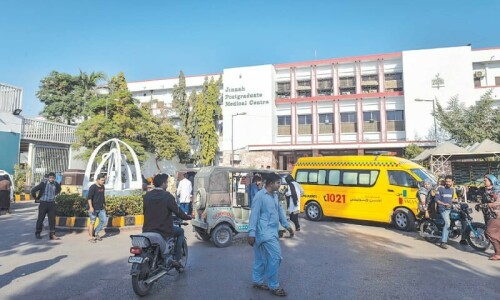KARACHI, Feb 26: While about 40,000 legs are lost as a consequence of diabetes annually in the country, which is home to about 7.1 million diabetics and 400,000 people with foot ulcers, research suggests that cases of amputation of lower limbs are linked to high mortality as renal and cardiovascular functions are also compromised in diabetics, said health experts at a symposium on Tuesday.
Titled Prevalence of peripheral vascular diseases in Pakistan, the symposium was held at the National Institute of Cardiovascular Diseases (NICVD).
Highlighting the need for proper diagnosis and treatment of peripheral vascular diseases, the experts said that although the country had seen advancement in the diagnosis, management and prevention of coronary heart diseases over the years, diseases of peripheral vessels, especially those supplying blood to limbs, had not been given due attention.
Considering the steep rise in diabetics, they said it was high time that medical experts focused on the subject.
About peripheral vascular diseases, Baqai Institute of Diabetology and Endocrinology (BIDE) director Prof Abdul Basit said it was a condition of the blood vessels leading to narrowing and hardening of the arteries that supply blood to legs and feet, with the result that blood flow decreased causing damage to nerves and other tissues. He added patients with a history of diabetes, heart disease, high blood pressure and smoking could have this disorder.
However, he said, the peripheral vascular disease was not as common in Pakistan as it was in the west. “Its frequency has been found to be 17.9pc in more than 17,000 diabetics who visited the BIDE,” he said.
Diabetic neuropathy was a major cause of foot ulceration in Pakistan, he added.
Highlighting the progress made under the National Diabetes and Diabetic Foot Programme, a joint venture of BIDE and World Diabetes Foundation, Prof Basit said the country’s first-ever training programme on diabetes management was launched in 2007, while 115 diabetic foot clinics were presently working across the country.
“The data collected from these clinics has shown that early intervention and counselling have significantly brought the rate of limb amputation down in specific groups of patients,” he said.
According to Dr Basit, the BIDE was one of the eight centres in the world which had the approval of the International Diabetes Federation for education and training on diabetes management.
Prof S.M. Muneer from medicine department of the Jinnah Postgraduate Medical Centre (JPMC) said diabetes was the fourth leading cause of death in the world. Type-2 diabetes was increasing globally at a rate of five per cent, he said, adding that the number would double by 2025.
“Every 30 second, a limb is lost worldwide due to diabetes and 85pc of these amputations are preceded by ulcers,” he said.
Financial constraints, lack of education, non-compliance of guideline on drugs and poor access to health facilities were some major factors that prevented people from seeking medical assistance for diabetes in time in Pakistan which, he said, was ranked seventh on diabetes prevalence list.
Research in Pakistan, he said, had shown that foot ulceration due to diabetes was more common among men and there were about 248,000 new cases of foot ulcers every year. The cost of ulcer management in Pakistan had been estimated to be Rs6.9bn.
“Non-healing ulcer is not an indication for amputation. When a doctor is considering a major amputation, he should also explore the option of revascularisation (a surgical procedure for provision of a new, additional or augmented blood supply to a body part),” he said.
Dr Kamal Mohammad Yousuf, vascular surgeon from Liaquat National Hospital, gave a surgeon’s perspective on peripheral vascular diseases and shared his experience in dealing with patients having peripheral vascular diseases. He also discussed limitations and hazards of surgery in some cases.
Dr Tahir Saghir, assistant professor in interventional cardiology at the NICVD, spoke about endovascular intervention in peripheral vascular diseases especially about the new technologies being used and underlined the importance of choosing the right intervention.
NICVD executive director Prof Khan Shah Zaman announced the opening of a programme on peripheral vascular disease management next month at the institute and called for collaboration in this regard.













































Dear visitor, the comments section is undergoing an overhaul and will return soon.